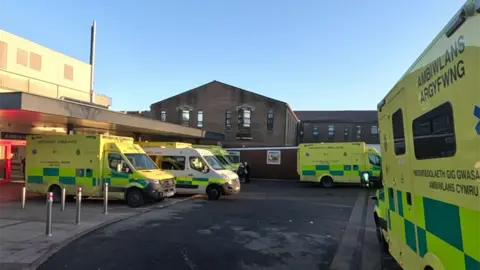Ambulances waiting two hours on average outside A&E
 BBC
BBCAmbulances have been waiting nearly two hours on average to hand over patients outside Welsh hospitals, new figures reveal.
The data, gathered by BBC Wales through a Freedom of Information (FOI) request, also shows 23,334 ambulances spent at least four hours waiting to hand over patients outside A&E last year.
Meanwhile nearly 73,000 ambulances were waiting at least an hour - an increase of 18% on 2023 and the highest annual number on record.
The Welsh Ambulance Trust said the handover delays were a symptom of "sustained and well-documented pressures across the entire NHS in Wales" and it was "thinking very differently" about delivering future services.
There were more than 6,500 ambulances in December alone which spent at least an hour outside A&E in Wales, the second highest figure on record.
A "very rare" critical incident was declared by the ambulance service on 30 December – when more than half its vehicles were waiting outside A&E to hand over patients.
At the time, its chief executive said that this was impacting the service's ability to respond to 999 calls.
In these instances, ambulance crews have to stay inside the vehicle with the patient because the emergency unit has not got the room to bring them in safely.
Official figures, which measure how many hours are "lost" above the 15-minute target for handing over patients, saw the total hit more than 25,000 hours in December.
The new figures show the average handover wait for December was more than two hours - and it was more than three-and-a-quarter hours within the Swansea Bay health board.
In 2024 overall, Swansea Bay – where the major emergency unit is Morriston Hospital – had average waits of more than three hours and nine minutes.
Meanwhile, in the Cardiff and Vale health board, the handover time at the University Hospital of Wales in Cardiff was less than 45 minutes.
Swansea Bay health board said it was "disappointed" by the latest figures as it felt efforts over the past year had seen it making inroads into the problem of ambulances waiting outside its emergency department.
It said this was backed up by recent NHS performance figures, which showed the health board in the second best position over "lost hours" in December, as well as delays over one hour.
"That said, we accept that patients are still waiting too long on ambulances and we apologise for that," it said.
"We are constantly looking at how we can manage demand for our services and secure improved flow through our hospitals.
"To do so we need to discharge more patients promptly – something we're constantly working on with our local authority partners."
Lee Brooks, executive director of operations at the Welsh Ambulance Service, said handover delays have the knock-on effect of significantly reducing the number of ambulances able to respond to patients in the community.
"We deeply regret the impact these delays have on our patients and their families," he said.
"This is not the standard of service we want to provide, and we recognise that this is not what the public expects of us.
"The time it takes for a patient to move from the ambulance into an emergency department is not directly in our control, so we are thinking very differently about the way we deliver services in the future."
"We don't believe that more ambulances doing more of the same is the answer," Mr Brooks added.
"We are actively looking at what we can do to use the skills of our people differently to ensure that patients get the right care or advice."
In December, 47.6% of immediately life-threatening "red" ambulance calls arrived within the eight-minute target time, the same as the previous month.
But the average number of red calls averaged 217 a day - the highest on record.
Mr Brooks said the public could help by using the service appropriately and by only calling 999 for serious and life-threatening emergencies.
The Welsh NHS Confederation, which represents health boards, said increasing ambulance handover delays were a "very visible symptom" of a whole system under immense pressure.
"The ambulance service and NHS leaders are working closely to reduce ambulance handover delays, share good practice and treat more people in the community," said Darren Hughes, its director.
"However, this is a whole system issue. Social care plays a crucial role in supporting people to remain independent for longer, preventing hospital admissions and supporting faster, safer discharges home.
"The sector plays a critical role in enabling the NHS to deliver safe and timely care."
He highlighted that "in some hospitals 20% of beds are occupied by patients waiting to leave", adding that without addressing workforce issues the NHS would "continue to struggle to make real strides in improving ambulance handover delays".
